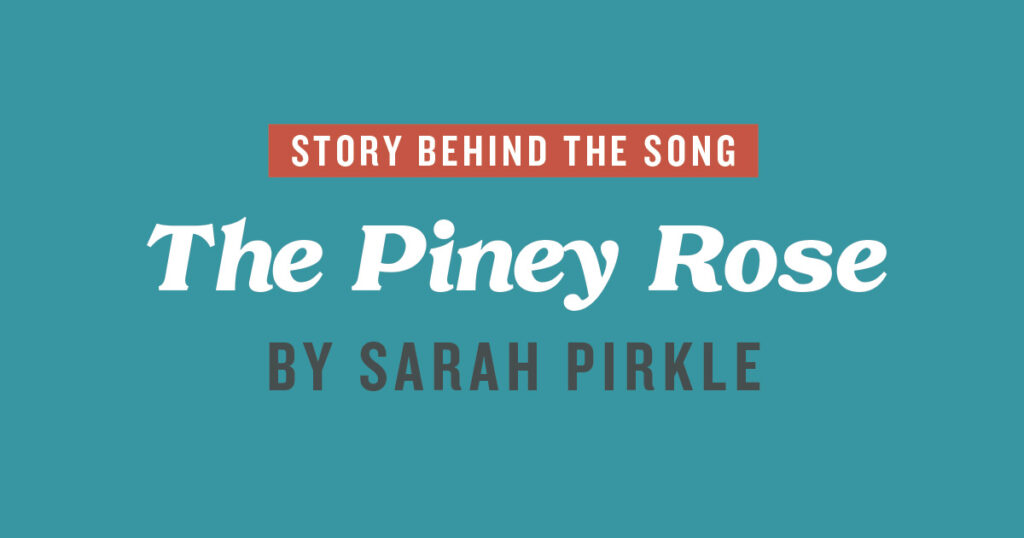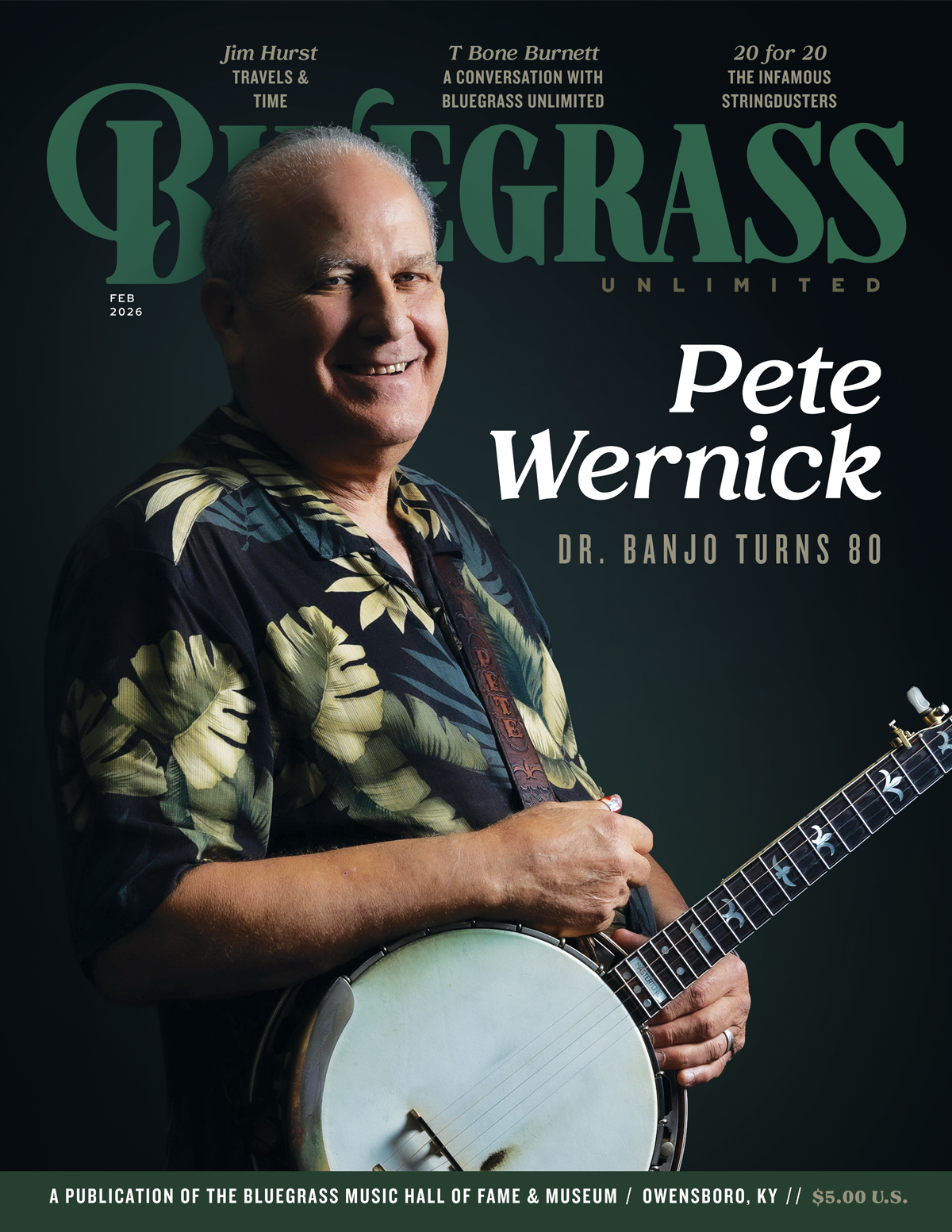The Piney Rose
By Sarah Pirkle
“The Piney Rose,” written by Sarah Pirkle, was first released in 2001 on Dog Years (Jeff Barbra and Sarah Pirkle, Barb Hollow Music). Already a favorite at Pirkle’s shows, the song then found an even broader audience when Dale Ann Bradley released it that same year on her Cumberland River Dreams (Doobie Shea Records). In 2003, artist Laura Walker also released a cover of the song.
Along with “The Piney Rose,” Bradley recorded Pirkle’s “Come Home Good Boy” on Somewhere South of Crazy (Compass Records, 2011). “I love Dale Ann, and after I heard her do ‘The Piney Rose,’ it stuck in my brain the way she phrased it, so much so that I stopped and reworked my version to match hers,” said Pirkle. “Laura Walker is a force of nature, too. I’m honored that she covered it!” Bradley shared her appreciation for the song and its writer, too, calling it a “precious story, one of Sarah’s jewels.”
Pirkle is a singer, songwriter, and musician who teaches fiddle and performs regionally with her husband, Jeff Barbra. The two make their home in Walland, Tennessee. They write songs (together and separately) and have produced two radio programs for WFIV Knoxville. Their song, “When I Come Home,” placed first in the prestigious (former) Chris Austin Songwriting Contest at MerleFest. They have recorded multiple albums together and separately, including The Barb Hollow Sessions (2004). That album included “Bury Me in The Red Clay,” which remained on the Bluegrass Unlimited National Bluegrass Survey for eight months, peaking at #12.
“The Piney Rose” is a tender, beautifully developed story song. While it isn’t technically true, it’s as good as true to plenty of mountain folk and others who can relate to its content. There’s nothing real tied to the song’s fictional character (Anna Carter) either, according to Pirkle, who credits the beautiful Tennessee countryside and a family member’s comment with planting the seed for the song. “My husband Jeff and I had just moved out to the country,” she recalled. “He’s from Blount County, Tennessee, in the foothills of the Great Smoky Mountains National Park. After we married, we moved out there to this little shack built in 1935. It was across the street and down the holler from Jeff’s aunt and uncle.
“Jeff’s Aunt Joy said, ‘You’re going to have the prettiest pineys down there,’ and I didn’t know what she was talking about. I thought she was talking about trees, but later when the flowers bloomed, she told me what they were. I began wondering, ‘How long have they been there? When were they planted? How many years have they bloomed?’” The “piney rose”… that’s mountain talk, you see, for the harder-to-pronounce peony.
Mining for a Song
One spring day, having meditated on those flowers in the valley near her home, Pirkle felt the song blossoming in her mind. “It was a beautiful day, and I was overcome with an uneasy feeling,” she said. “I went outside and looked around. The peonies were in bloom, and the story just kind of fell on me. It happened so fast, I almost feel like I didn’t write it, but of course I did.”
She began to see the song’s main character in her mind. “I could picture her there, this little lady, with her two braids piled atop her head like they used to do,” said Pirkle. “I had one line: ‘In May, this valley is a shining jewel,’ and I excavated the song around it. But then, that’s the way I write. Now and then, I’ll have an assigned subject in my mind, but most often, I’ll have a phrase or a visual, and I’ll just sit and play the guitar until I tune in to the idea.”
As she played that day, out came a rich, mountain-ballad melody perfectly suited to the song’s poignant lyrics. In verse one, we meet Carter, a mountain woman of 90 years, who faces what she feels will be her last hard winter. February, to be exact (The winter is the longest / That old February sky is cold and gray). “It’s a theme in a lot of my songs … about how February is so depressing,” revealed Pirkle. “So, I was thinking, what if it was February, and you knew that the beautiful springtime in east Tennessee was around the corner? Wouldn’t you want to hang on and get to see that before you took off?”
Anna Carter would have, Pirkle decided, and penned the chorus to reflect Carter’s prayer requesting as much. Building on the “shining jewel” line from which she started, Pirkle wrote the chorus: Oh please don’t call me home until the summer / For in May, this valley is a shining jewel /I long to see the colors of my childhood / I’m waiting on the piney rose to bloom.
In verse two, Pirkle moves the story along well, elaborating on the reason for Carter’s deep appreciation for the pineys: I’ve tended the flowers that my mother planted when I was born / And they come up faithfully every spring, to remind me of her everlasting love.
The imagery is strong throughout the song, its vivid lines painting scenes generations of mountain residents would recognize from their own or a loved one’s mountain landscape. Perhaps it’s that nostalgia—enveloped by a moving melody—that causes “The Piney Rose” to resonate so much with listeners. “At almost every show, someone will ask for it, and I’m happy to oblige,” said Pirkle, who often receives gifts related to the song. “People send me pictures, and sometimes, someone will bring me peonies. One listener’s mother did a needlepoint of the piney rose, and I have a print of it. I get a call about once a year for someone who wants me to sing it for their loved one’s funeral.”
A Song Yields a Friendship
As you can see, “The Piney Rose” has acquainted Pirkle with new fans and friends. She credits the song for bringing her one of her best friends and bandmates, Griffin Vann, an east Tennessee native who was living in Colorado when she first heard “The Piney Rose.”
“Later, Griffin moved back to Tennessee, and she ended up at my house,” explained Pirkle of how the two connected through mutual friends. “Somebody had said, ‘You need to have this girl over,’ because I would have little pickin’ parties.”
So, in Pirkle’s living room, Vann requested the song. “She said to me, ‘I’ve heard you do ‘The Piney Rose,’ and I’d like to hear your version of it,” smiled Pirkle, who by then hadn’t met anybody who knew her well but didn’t know that she wrote the song.
Vann elaborated on their meeting with the admission that, right there in Pirkle’s living room, she put her foot in her mouth. “I first heard the song performed by Dale Ann Bradley,” explained Vann. “It was an arrow to my heart in how it painted a picture of the life of an Appalachian woman living in the mountains of East Tennessee. That area is ingrained in me, and the song made me homesick! I absolutely loved the recording and since Dale Ann is an incredible songwriter herself, I originally thought she wrote the song. A year or so later, I heard Sarah’s recording, but thought it was a cover. When I asked Sarah to do ‘her version of it,’ she looked at me kind of funny, but sang it without commenting. A bit later, I saw and mentioned a picture of a piney rose on her bookshelf, and I realized I was talking to the songwriter! I was embarrassed, but luckily for me, Sarah’s awesome and it became a big joke.
“There are so many things about ‘The Piney Rose’ that are special to me,” added Vann, “but the best thing about it is the amazing friendship it brought me in Sarah. Sarah’s writing is beautiful, earthy, and reflective of the culture that she knows and loves. People connect to that, including me.”
In 2021, Sarah Pirkle was inducted into the East Tennessee Writers Hall of Fame. Her songs have been recorded by bluegrass artists Bradley, Darrell Webb, Charlie Sizemore, Blue Moon Rising, and others. Learn more about her music at jeffandsarahmusic.com.
Share this article
1 Comment
Leave a Comment Cancel Reply
This site uses Akismet to reduce spam. Learn how your comment data is processed.


Thanks for writing about Sarah. Your writing about it made me well up, the song brings the tears.